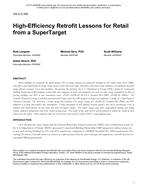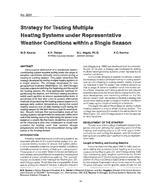Click here to purchase
Buildings are complex systems, yet architecture, engineering, and construction (AEC) professionals often perform their work without considering the humanfactors that affect the operational performance of the building system. The AEC industry currently employs a linear design and delivery approach, lackingverified performance standards and real-time data feedback once a certificate of occupancy is issued. We rely on static monthly utility bills that lag and maskoccupant behavior. We rely on lawsuits and anecdotal business development trends as our feedback mechanisms for the evaluation of a complex, systembasedproduct. The omission of human factors in the design and delivery of high performance building systems creates risk for the AEC industry and hascontributed to projects missing their performance targets. Neglecting an iterative, human-centered design and delivery approach inhibits our ability to closethe industry’s performance gap and relinquish its position as the top energy consuming sector. To close this gap, a multi-methods research design is employedto answer applied research questions that will serve as a vehicle to identify and jointly optimize human-building relationships. Specifically, this study reportsfindings from a multi-year study of the construction, and operations of 15 high performance multifamily housing projects in Virginia. Data include 1)originally simulated versus measured energy use data, 2) construction technologies and delivery methods, 3) commissioning procedures, and 4) occupantreported factors including thermostat set points, thermal comfort, appliance use, and user satisfaction with high performance housing. Preliminary findingssuggest the use of Human Factors methods can improve our understanding of the construction, operations, and maintenance outcomes of high performancemultifamily housing. Results from this work can be shared with AEC professionals to close the post-occupancy performance gap in high performance systems.
Citation: 2019 Winter Conference, Atlanta, GA, Conference Papers
Product Details
- Published:
- 2019
- Number of Pages:
- 8
- Units of Measure:
- Dual
- File Size:
- 1 file , 1.2 MB
- Product Code(s):
- D-AT-19-C033


